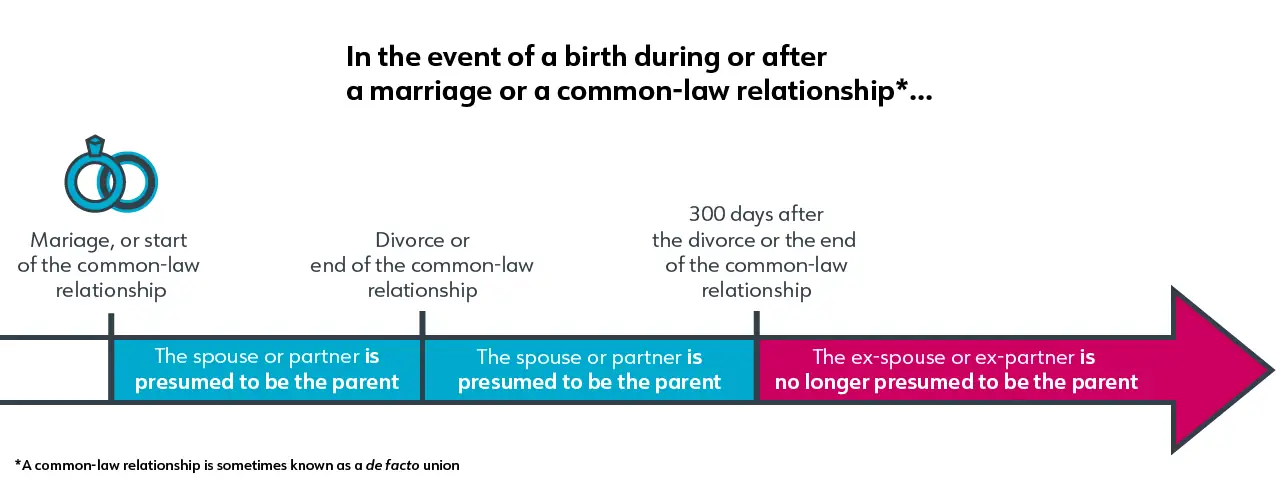Did you just find out that you’re the biological father of a child that you never knew about? Or that you’re not the biological father of one of your children? Or are you a child whose biological father isn’t on your birth certificate, and you would like to add them? Sometimes, a legal parent’s status can be contested or proven in court.
Filiation is the legal relationship between a child and parent. This legal relationship creates rights and responsibilities for both the child and the parent. The people named on the child’s birth certificate are their legal parents.

|
Important! This article is not for parents who had children through
For information about your situation, see our other articles on these topics. |
Knowing when a legal parent’s status can’t be contested
Someone’s status as a child’s legal parent can’t be contested in a situation where both these things are true:
- They’re named on the birth certificate as the child’s parent.
- They maintained « uninterrupted possession of status » by acting as the parent’s child from the moment they were born.
In this case, the relationship of filiation between the child and this legal parent can’t be changed.
Two factors are important for understanding whether someone maintained « uninterrupted possession of status » with a child:
- Actions: Did they treat the child like their own? For example, were they present at the birth, did they change diapers, did they take the child to doctor appointments, and more?
- Consistency: Did they act this way consistently from the moment the child was born for at least two years?
Here’s an example. Let’s say that a man and a woman are together as a couple. The woman has a child. The man adds his name to the birth certificate as the child’s father. The man takes care of the child as his own. After a few years, the man finds out he isn’t the child’s biological father. In this case, this man’s status as a legal parent can’t be contested. He can’t ask for it to be changed and neither can the mother, the biological father, or the child.
Contesting a legal parent’s status in court
In situations where a legal parent’s status can be contested, anyone with a good reason can do so.
If the court rules in favour of the person contesting a legal parent’s status, this person’s relationship of filiation with the child won’t exist anymore. They will no longer be the child’s legal parent. Their name will be removed from the child’s birth certificate. They will no longer have any rights or responsibilities when it comes to the child.
There’s usually no time limit for contesting a legal parent’s status in court. Any person with a good reason can do this at any time. The exception is situations where the child or legal parent has died. In this situation, there’s a time limit for heirs who want to contest a legal parent’s status.
Here are some examples of people who could have a good reason for contesting a legal parent’s status:
- The child (on their own behalf if they’re 18 or older)
Example: Someone finds out the legal father named on their birth certificate isn’t their biological father. Their legal father never took care of them. This person could contest their legal father’s status in court and get them removed from their birth certificate.
- A family member who doesn’t want a child to inherit
Example: An unmarried man agrees to recognize his partner’s child as his own even though he’s unsure whether he’s the biological father. He’s named on the birth certificate as the legal father. But a few months later, he breaks up with the mother and stops taking care of the child. This man dies a few years later without a will. According to the law, the child will be this man’s sole heir. If the man’s other family members have reason to believe he wasn’t the child’s biological father, they could contest his relationship of filiation with the child so that they can inherit from him instead.
- A biological parent
Example: A woman is married but has a child with another man. Because she is married, her husband is presumed to be the child’s parent. The husband’s name is also on the birth certificate. However, the husband works outside the country and has never taken care of the child. The child’s biological father could contest the husband’s status as a legal parent.
|
Presumed filiation
|
Proving someone’s status as a legal parent in court
It’s also possible to prove someone’s status as a legal parent in court. This is called claiming filiation. If the court rules in favour of the person’s claim, the new parent’s name will be added to the birth certificate. This new parent will have the same rights and responsibilities as any parent would when it comes to the child.
In Quebec, a child can have a maximum of two legal parents. So, if the child already has two parents on their birth certificate, the person claiming filiation will also need to contest the status of one of these legal parents at the same time.
Keep in mind that a parent’s legal status can’t always be contested. If someone’s name is on the birth certificate and they maintained uninterrupted possession of status with the child, their relationship of filiation with the child can’t be changed.
There’s usually no time limit for proving someone’s status as a legal parent and claiming filiation. The exception is situations where the child or legal parent has died, in which case there is a time limit.
These people can prove someone’s status as a legal parent in court and claim filiation:
- The child’s biological parent
Example: A woman is married but has a child with another man. The husband never took care of the child, but his name is on the birth certificate. The child’s biological father can contest the husband’s relationship of filiation with the child. At the same time, he can also prove his own relationship of filiation with the child.
If a child’s birth is the result of sexual assault, the child can contest this claim from the “biological father” for status as a legal parent. If the child is under 18, it’s usually the child’s mother who will contest this claim on their child’s behalf. - The child (on their own behalf, if they’re 18 or older)
Example: A child is raised by their single mother and doesn’t know their father. When they turn 18, their mom tells them who their biological father is. The child can ask a court to recognize their biological father’s status as their legal parent and add his name to their birth certificate.






